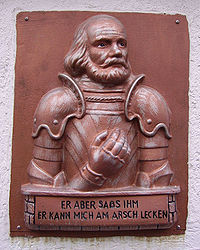
Swabian salute
Encyclopedia

German language
German is a West Germanic language, related to and classified alongside English and Dutch. With an estimated 90 – 98 million native speakers, German is one of the world's major languages and is the most widely-spoken first language in the European Union....
schwäbischer Gruß, m.) is a partly humorous, partly euphemistic
Euphemism
A euphemism is the substitution of a mild, inoffensive, relatively uncontroversial phrase for another more frank expression that might offend or otherwise suggest something unpleasant to the audience...
reference to the expression "Leck mich am Arsch" ("kiss my arse", but literally "lick me in/on the arse") which is a common profanity.
Origin
Perhaps the idea which is expressed in the literal meaning goes back to ancient magic conceptions that turning the bare bottom towards a danger or unwanted person (a demon, a witch, a curse) will work as a protection spell. Also, a reference to the feudal homageHomage (medieval)
Homage in the Middle Ages was the ceremony in which a feudal tenant or vassal pledged reverence and submission to his feudal lord, receiving in exchange the symbolic title to his new position . It was a symbolic acknowledgment to the lord that the vassal was, literally, his man . The oath known as...
kiss could be recognized. Stone depictions of this act can be found on gates and walls of medieval buildings such as castles, town fortifications, monasteries and even churches in south Germany (not limited to Swabia
Swabia
Swabia is a cultural, historic and linguistic region in southwestern Germany.-Geography:Like many cultural regions of Europe, Swabia's borders are not clearly defined...
), Austria, eastern France and some other places in Spain and Italy.
Use
Although very common in most German-speaking areas with the possible exception of the extreme north of Germany, the Swabian salute is being used for a whole number of purposes among the people of Swabia, BadenBaden
Baden is a historical state on the east bank of the Rhine in the southwest of Germany, now the western part of the Baden-Württemberg of Germany....
, parts of Bavaria
Bavaria
Bavaria, formally the Free State of Bavaria is a state of Germany, located in the southeast of Germany. With an area of , it is the largest state by area, forming almost 20% of the total land area of Germany...
and Austria, while in most other regions it is regarded as a rather vulgar insult only.
According to the reasons given for a judgement of a German court, the mentioned words can serve the purpose of "picking up an earlier conversation, continuing a stagnating conversation, giving new impulses to a conversation, ultimately end a conversation". Writer Thaddäus Troll, who cited the court in his 1975 book Preisend mit viel schönen Reden, added more reasons: "to express surprise, to express joy about unexpectedly meeting a fellow Swabian, to turn down a request regarded unacceptable". Naturally, the salute is also being used as an insult in the mentioned regions. The intended sense must be carefully judged by context and intonation.
As with any popular phrase of this kind, a multitude of variations and more or less humorous replies exist. A very common abbreviation which is understood anywhere is LMAA; it is also used in spoken language. The short form "Leck mich" is widely known as well.
In Arts
The swabian salute first received literary honors in Goethe'sJohann Wolfgang von Goethe
Johann Wolfgang von Goethe was a German writer, pictorial artist, biologist, theoretical physicist, and polymath. He is considered the supreme genius of modern German literature. His works span the fields of poetry, drama, prose, philosophy, and science. His Faust has been called the greatest long...
drama Götz von Berlichingen
Götz von Berlichingen
Gottfried "Götz" von Berlichingen and also known as Götz of the Iron Hand, was a German Imperial Knight and mercenary....
and can also be found in title and text of two canons
Leck mich im Arsch
Leck mich im Arsch is a canon in B-flat major composed by Wolfgang Amadeus Mozart, K. 231 , with lyrics in German. It was one of a set of at least six canons probably written in Vienna in 1782...
composed by Mozart
Wolfgang Amadeus Mozart
Wolfgang Amadeus Mozart , baptismal name Johannes Chrysostomus Wolfgangus Theophilus Mozart , was a prolific and influential composer of the Classical era. He composed over 600 works, many acknowledged as pinnacles of symphonic, concertante, chamber, piano, operatic, and choral music...
in 1782 (Köchel catalogue 231, 382d) and Wenzel Trnka
Wenzel Trnka
Wenzel Trnka von Krzowitz was a physician, professor, and amateur composer of the 18th century.-Life:...
(the latter having been being mistakenly attributed to Mozart for many years as well).
Literature
- Thaddäus Troll, Preisend mit viel schönen Reden, 1975

